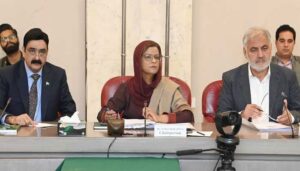Govt rightsizing drive starts with IT ministry

IRC orders Telecom Foundation closure, NITB restructuring, PSEB to boost revenue
ISLAMABAD:
The government has decided to shut down and privatise certain institutions attached to the Ministry of Information Technology & Telecommunication as part of its federal rightsizing programme. Sources report that the Ministry of Information Technology has issued directions to this effect.
Previously, there were discussions about closing the IT ministry entirely, but telecom companies opposed this move, arguing that the ministry serves as a crucial liaison for addressing industry issues. Consequently, the government opted to close some departments within the telecom ministry instead.
The Institutional Reforms Committee (IRC) has directed the shutdown of the Telecom Foundation, with its subsidiaries to be privatised. The National Information Technology Board (NITB) is set to undergo a massive restructuring to create a lean organisation partnering with private service providers and adopting an outsourced model. The Pakistan Software Export Board (PSEB) has been instructed to increase its revenue to at least Rs1 billion, reducing its reliance on government funding, with occasional support from the Public Sector Development Programme (PSDP).
The IRC has also decided to continue the operations of Virtual University, Universal Service Fund, and Ignite, but plans to gradually allow for private sector intervention once market failures are addressed. The IT ministry has requested a detailed implementation plan based on these directives. Earlier, a committee formed by the cabinet considered closing five ministriesInformation Technology and Telecommunication, Kashmir Affairs and Gilgit-Baltistan, States and Frontier Region Division (SAFRON), Industries and Production, and National Health Services, Regulations and Coordinationas part of a plan to streamline the federal government and state-owned enterprises (SOEs). The committee explored options such as retaining, closing, modifying, or transferring these ministries to provincial governments.
A recent cabinet meeting featured a presentation on the committee’s role in identifying federal functions for privatisation, public financing, or reorganisation for efficiency. The committee also aims to determine which functions should be purely provincial, without international collaboration.
The committee held three meetings to develop criteria for rightsizing and requested data from all ministries regarding their structure, employee status, budget, and function justification. The evaluation includes recommendations on whether functions should be stopped, retained, transferred, devolved, or privatised, along with suggestions for improvements.
The first phase focuses on five ministries, with reports due on August 2 and August 12, 2024. The committee is also reviewing the performance of SOEs, identifying 84 entities, of which 55 are under review. Thirteen SOEs are deemed essential, five strategic, 15 slated for privatisation, and 22 pending further review. Some ministries have yet to submit their SOE cases, with the cabinet requesting a detailed update in the next meeting.





